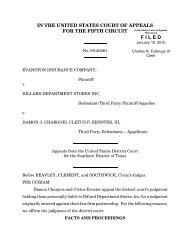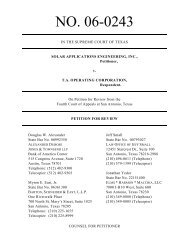Case: 09-10622 Document: 00511064454 Page: 14 Date Filed: 03/29/2010No. 09-10622particularities and structure of the Internal Revenue Code. Further, like inCostas, <strong>Laughlin</strong> renounced his interest in his father’s estate pre-petition, which10factually differentiates the post-tax-lien disclaimer in Drye. Accordingly,Simpson continues to be good law, post-Drye, and we must look to Louisiana lawin order to determine whether <strong>Laughlin</strong> transferred “property” or an “interestin property” here.C. Renunciation of Inheritance Rights under Louisiana LawUnder the Louisiana Civil Code, “[a] successor is not obligated to acceptrights to succeed [inheritance rights]. He may accept some of those rights andrenounce others.” LA. CIV. CODE ANN. art. 947 (West 2000). “To the extent thata successor renounces rights to succeed, he is considered never to have hadthem.” Id. art. 954 (emphasis added). “<strong>The</strong> rights of an intestate successor whorenounces accrete to those persons who would have succeeded to them if thesuccessor had predeceased the decedant.” Id. art. 964.<strong>The</strong>se provisions in the Louisiana Civil Code are comparable to the Texaslaw at issue in Simpson and the Arizona law at issue in Costas becauseLouisiana law also treats a renouncing successor as never having had an interestin property. Cf. Simpson, 36 F.3d at 452 (“<strong>The</strong> effect of the relation backdoctrine is that a beneficiary never gains possession of disclaimed property.”);Costas, 555 F.3d at 794 (“In short, Arizona’s relation-back rule says that adisclaimant neither transfers nor possesses an interest in disclaimed property. . . .”). As such, <strong>Laughlin</strong> urges that, as in Simpson, we should hold that10It has been recognized by several courts and commentators that post-petitiondisclaimers of inheritance are not valid under 11 U.S.C. § 541(a)(5). See, e.g., Parker, supranote 7 at 38 (“[T]he language of [§ 541(a)(5)] evidences congressional intent to secure for thetrustee the power to accept the devise on behalf of the creditors and to preclude the debtorfrom exercising the power to disclaim.” (collecting cases)). We do not confront this issue todaygiven that <strong>Laughlin</strong> renounced his interest pre-petition.14
Case: 09-10622 Document: 00511064454 Page: 15 Date Filed: 03/29/2010No. 09-10622<strong>Laughlin</strong>’s pre-petition renunciation of his interest in his father’s estate was nota “transfer” of “property” or an “interest in property” under § 727(a)(2).<strong>Nouveau</strong> responds that the Louisiana law is different from the state lawsat issue in Costas and Simpson and urges that its differences are sufficient tosupport the district court’s determination that <strong>Laughlin</strong> transferred property oran interest in property for the purposes of § 727(a)(2). Specifically, <strong>Nouveau</strong>argues that Louisiana law allows a creditor to reopen the succession to accepta debtor’s renounced interest, with the result that there is a creditor’s “interestin property” sufficient to support the denial of <strong>Laughlin</strong>’s discharge under§ 727(a)(2). We disagree. 11Under Louisiana law:A creditor of a successor may, with judicial authorization, acceptsuccession rights in the successor’s name if the successor has11<strong>Nouveau</strong> also argues that Louisiana Civil Code article 960 supports its argument that<strong>Laughlin</strong> transferred property under § 727(a)(2). Article 960 provides that:A renunciation shall be deemed to be an acceptance to the extent that it causesthe renounced rights to devolve in a manner other than that provided by law orby the testament if the decedent died testate.LA. CIV. CODE ANN. art. 960. Commentators have interpreted article 960 as pertaining tosituations where the successor, in the act of renunciation itself, tries to direct his interest ina manner other than that provided by law (i.e., “I renounce in favor of X.”). See KATHRYNVENTURATOS LORIO, 10 LA. CIV. L. TREATISE § 6:5 (discussing article 960 but recognizing thata renunciation in favor of all coheirs may be valid); Matthew D. Simone, Comment, LouisianaPost-Mortem Estate Planning—Alleviating the Burden of Double Taxation Imposed against a“Renunciation in Favor of,” 54 LOYOLA L. REV. 905 (2008) (same); see also Aurienne v. Mt.Olivet, Inc., 96 So. 29, 31 (La. 1922) (stating that a renunciation made in favor of only onecoheir would typically be problematic).Where such a renunciation is made, article 960 deems that the successor has acceptedand then donated his interest, rather than renouncing it. However, <strong>Nouveau</strong> does not arguethat <strong>Laughlin</strong>, in his act of renunciation, directed his interest in his father’s estate in amanner other than provided by law. Indeed, <strong>Nouveau</strong> admits that <strong>Laughlin</strong>’s renunciationwas formally valid, and argues instead that the scheme to transmit his inheritance interestto his mother should be deemed an “acceptance” of his renounced interest. We are notpersuaded. <strong>Laughlin</strong>’s renunciation was formally valid and led to his interest passing to hisdaughter, by operation of law. Though we conclude that our inquiry ends there, we note that<strong>Nouveau</strong> has not alleged, much less shown evidence, that <strong>Laughlin</strong>’s daughter was somehowbound to transmit the renounced interest so as to make Lauglin’s renunciation a “renunciationin favor of” that triggers article 960.15




